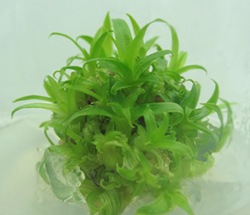KOSRAE, FSM. Dr. Virendra M. Verma, Researcher and Extension Specialist, Kosrae Agricultural Experiment Station.

The United States Department of Agriculture, National Institute of Food and Agriculture (USDA-NIFA) has approved another multi-state/site research project for Micronesian region. The project entitled: Pineapple Micropropagation and Commercial Cultivation to Enhance Productivity in Micronesia, is the second multi-state/site research project initiated after recent recommendations from the College of Micronesia’s Board of Regents. The project director of this project Dr. Virendra M. Verma shared that this project aims to enhance pineapple production in the Federated States of Micronesia (FSM) and the Republic of the Marshall Islands (RMI) through micropropagation and commercial cultivation. Non-availability of disease-free and elite seedlings, shortage of trained agricultural professionals, and limited acquaintance of farmers with commercial cultivation techniques have significantly restricted pineapple production in Micronesia. This project aims to enhance pineapple production to improve food self-sufficiency, nutritional security, and provide means of income generation in Micronesia.
This project is of great significance as it is specifically designed to optimize micropropagation and nursery management systems to produce elite and disease-free pineapple seedlings in bulk quantities, provide appropriate recommendations and adequate opportunities to educate and train local farmers in sustainable and commercial pineapple production. Pineapple (Ananas comosus L. Merrill), the most economically significant plant in the Bromeliaceae family, is one of the most important horticultural crop in the tropical and sub-tropical regions of the world. In Micronesia, pineapple is a desirable fruit in traditional feasts. The crop also has great potential for export. Mainly grown for fresh and canned fruit and juice, pineapple is the only source of bromelain enzyme that is used in pharmaceuticals and as a meat-tenderizing agent. The fresh fruit is very low in saturated fat, cholesterol and sodium. It is also a good source of dietary fiber, thiamin, vitamin B6 and copper, and a very good source of vitamin C and manganese.
To overcome the limitations affecting pineapple production in Micronesia, the project activities include: Collection of pineapple germplasm of local cultivars and establish in vitro cultures of collected germplasm; refinement of micropropagation protocol for multiplication of collected pineapple germplasm; optimization of acclimatization and nursery management systems to produce elite seedlings for commercial pineapple cultivation; designing, implementing and conducting research trials for commercial pineapple cultivation at multiple sites and collection of data for analysis; and development and publication of commercial pineapple cultivation guide to specifically suit the needs of local farmers. Recommendations will be provided for sustainable pineapple production through training workshops, hands-on trainings, farm visits, and field days. Two pilot sites in Micronesia i.e., one each at the Federated States of Micronesia (FSM) and Republic of Marshall Islands (RMI) will be developed as demonstration sites for research, extension, and education activities of the project aiming to promote commercial pineapple production.
The extension and outreach activities will develop positive attitudes, zeal for learning sustainable cultivation techniques and farming aspects of pineapple, and will change the behavior of the participating farmers. Participants of extension and outreach activities will be guided to adopt recommended techniques and start commercial pineapple production farms. The ultimate goal of the project is to develop sustainable commercial pineapple production systems in Micronesia through providing elite, disease-free pineapple seedlings and by providing training to local farmers to improve their knowledge and skills for sustainable, commercial pineapple production.